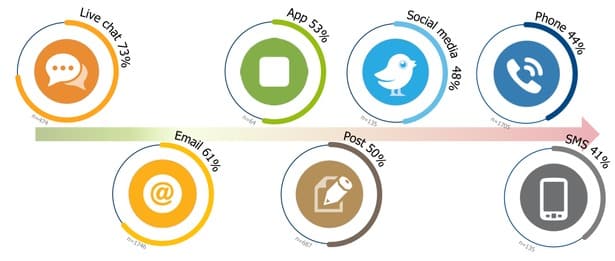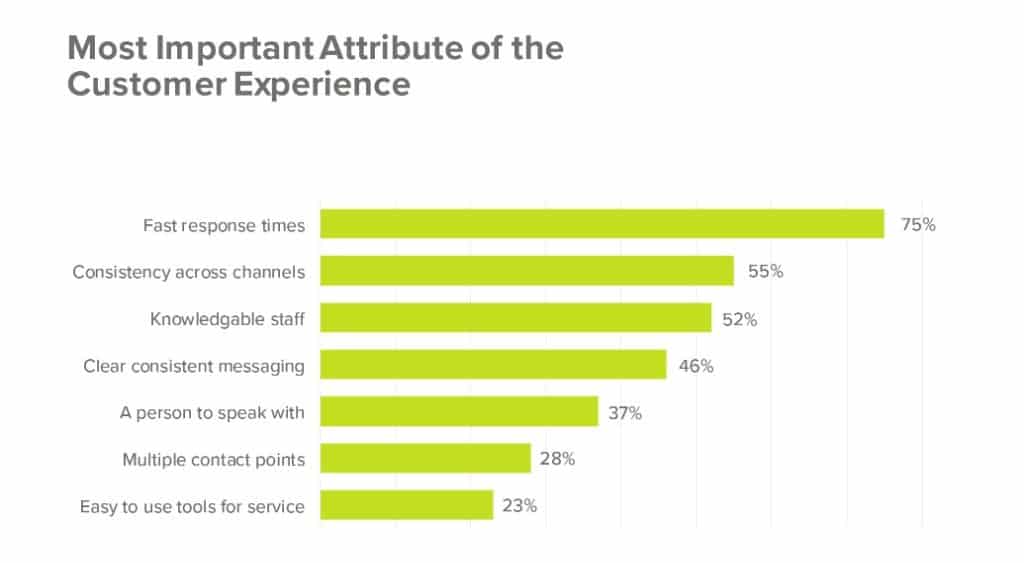This article has been contributed by Michelle Laurey.
Live chat software has been around for almost half a century, which makes it older than the internet itself. It started with the PLATO system, which then gave way to Talkomatic.
Today, live chat is everywhere. There are applications dedicated to live chat, such as Whatsapp and Wechat, and it is in every social media platform we use.
Moreover, live chat has become an integral part of doing business for many brands. It has started to populate almost every website on the internet and has become the preferred method for companies to communicate with their customers.
Therefore, an important question that brands face today is whether they should incorporate live chat into their site, and if so, how to make it as efficient as possible.
Should Companies Use Live Chat on Their Websites?
Companies can figure out whether they should use live chat or not by judging the pros and cons of this decision.
The Pros of Live Chat:
1. Live chat is quick
Live chat makes your company more accessible to your clients. It also offers a channel where the average resolution time is lower than on other service channels. It is estimated that a customer’s issue can be resolved in under a minute using live chat.

2. Live chat gives your agents a preview of the customer’s written text
As the customer is typing their query or complaint, your agents can see what is being written before the customer hits that enter button. This saves both the agent and customer time. It also enables your agents to provide prompt and well-thought-out responses, impressing your customers.
3. Live chat enables your agents to handle multiple customers simultaneously
Live chat’s overall functionality enables your agents to handle more than one customer at a time rather than being glued to a telephone, maintaining a conversation with a single client.
4. Live chat is cheap
When compared to other customer service channels, live chat is the cheapest.
5. Live chat strengthens understanding
Live chats prevent misunderstandings that pop up due to foreign accents or overwhelming background noises. This is a big reason why live chat has been gaining steady popularity over the years. The number of consumers preferring it over alternative means of communication has increased by 50 percent since 2012.
You can also use translation software with your live chat. This will enable your agents to overcome possible language barriers, which isn’t possible with phone support. In fact, communicating with customers in their native tongue will not only increase their satisfaction, but it will also make them more loyal to your brand.
6. Live chat allows for automation
With the help of a chatbot, you can automate a large portion of your site’s live chat. In addition to taking some of the load off your agents’ shoulders, bots can also keep the conversation going 24/7.
7. Live chat is the customers’ favorite channel
Live chat is popular with today’s customers: It creates the highest satisfaction levels compared to other channels. According to Econsultancy, almost 3 out of every 4 consumers prefer live chat to other mediums.

Image source: Econsultancy
The Cons of Live Chat:
1. Live chat may feel impersonal
A large part of the message we communicate to others is carried in our tone, the inflections we use, the volume of our voices, and the pauses that intersperse our speech. All of these are lost in live chat. Moreover, for some senior citizens, live chat may be challenging to navigate. They might prefer a more personal touch, such as a telephone call.
2. Live chat may be difficult to maintain around the clock
Unless you use a chatbot, you might find it difficult to offer customer service to those living in different time zones. You could try hiring several customer service agents, making sure that your live chat is covered 24/7, but this might prove a bit costly.
3. Live chat may not be ideal for complicated or detailed problems
Even though live chat is faster than other channels, it can be slow when it comes to detailed or complex problems. This is because customers can usually speak faster than they can type. If their problem requires a lot of explaining, then perhaps a phone conversation might be better suited to handle their issue.
So, Should Your Company Go For Live Chat?
As you might have noticed, the pros list far outweighs the cons. Assuming that you are convinced that you should use live chat, the next question is, how do you successfully incorporate it into your site?
There are two things you need to do. Firstly, you want to hire agents who have the necessary skills for the job. Secondly, you want to put in place a system that guarantees maximum efficiency.
Let’s look at each one of these things separately.
What To Look For When Hiring Live Chat Agents
To maintain an efficient live chat system, you want to hire people with certain qualities and skills. Here are some of the skills you should be looking for:
1. A thorough understanding of your business
This is also known as having domain knowledge. Your chat agents should know your products inside and out and know which problems affect the customers the most.
This is one reason outsourcing customer service isn’t always a good idea. Your customers are liable to get agitated with incompetent agents, costing you valuable business.
2. Excellent communication skills
First, let’s be clear with what we mean when we say “communication skills”.
For starters, seeing as live chat agents can’t use their voice to convey a message, they need to be able to communicate wholly in words. This means having excellent grammar, spelling and punctuation. It also means knowing how to be frugal with words while still being crystal clear.
In a book about business first impressions called “Put Your Best Foot Forward,” the authors indicate that proper grammar is essential for building credibility, displaying confidence, and showing the customer that you are a professional who can meet their business needs.
Interestingly, in the case of live chat, your agents also need to be quick when it comes to typing and accurate when it comes to data entry. Simply put, the faster they type, the faster they can respond to your customers’ queries.
3. Responsibility
When you take responsibility for your work, you take ownership of the tasks assigned to you and make sure that you complete them even if you have to come up with out-of-the-box ideas every once in a while.
This quality is necessary for your agents who have to handle customer problems and solve them all day long. After all, while some issues can be solved quickly, other matters might require a delicate, persistent hand that diligently pushes until the problem is resolved.
Their willingness to go that extra mile will make your customers feel valued, increasing retention, and maximizing customer lifetime value.
If the customer needs to be directed to a particular department, the agent should not only guide them there but also keep following up with them until their problem is solved.
If the customer feels slighted in some way, the agent should have enough latitude to find an appropriate remedy. This can include giving the customer gift vouchers or offering them free delivery services.
More importantly, should one of your agents come up short and be unable to fix a customer’s problem, they should own that and take responsibility for it. This means choosing to learn from their mistakes and making sure never to repeat them.
4. Honesty
One of the critical things that can help your business succeed is transparency. It fosters trust, establishes credibility, and shows your customers that you are willing to own your work, the good with the bad.
Your agents should always be willing to tell the truth, even when it isn’t in your immediate best interest. For example, if your customer is eligible for a discount coupon, your agent should inform them of this, saving them some money. Despite the money lost today, this honesty will help you retain this customer for the future.
5. The ability to multitask
As we mentioned earlier, one of the main benefits of live chat is that your agents can handle more than one client at the same time.
However, to make the most of this, your agents need to be adept at multitasking. In other words, it’s not enough to handle four or five customers simultaneously; your agents should be able to give them all equal attention, making them all feel like your company’s top priority.

Image source: superoffice.com
A large aspect of customer satisfaction hinges on your agents’ response time. The less time it takes your agent to get back to a customer and to help them solve a problem, the more likely your customers will be satisfied, which will increase your live chat’s ROI.
6. Patience and empathy
Even though these may seem like different qualities, they are closely related when it comes to customer service.
Plenty of your customers might be frustrated by the problems they face. It is not unusual for a customer to take out their frustrations on your customer service agents. After all, who hasn’t heard of the angry customer shouting over the phone, blaming a company for everything wrong with the world?
In these cases, the best tool in your agents’ arsenal will be patience. Your agents will have to calmly try to figure out the customer’s problem, try to find an adequate solution, and try to do all of this without losing their head.
One thing that can help them in this endeavor is having empathy. If your agent can see things from the customer’s perspective and knows how to speak their language, this helps your agent remain patient while calming the angry customer.
Types of Live Chat Agents
These are just the basic skills required for the job. However, any extra skills you should look for depends on the type of agent you are hiring.
1. Informational agents
These are the live chat agents responsible for relaying information and answering questions. They provide your customers with objective data that can help when it comes time to make a decision or to take action.
For these agents, the qualities above should be more than enough.
2. Sales agents
A sales agent needs to be able to do everything an informational agent does and more. Their role goes beyond providing information; they need to understand the needs of the customer and convince them that your company can meet those needs.
Sales agents need the same skills required by informational agents, but there are a few extra requirements as well:
- understanding people and their needs
- knowing how to build a rapport with your customers
- knowing how to close a customer who is on the fence
3. Customer service agents
When you need to look after both your existing and future customers, you need customer service agents. They will help anyone with a problem and act as ambassadors for your brand.
Of all the types of agents, they have the largest workload. As we looked at the different qualities necessary for the job, we were thinking of customer service agents all along. Ergo, we have already covered most of the required skills.
However, we do have to talk about the powers you imbue your customer service agents with. You need to give them access to old customer records because it may come in handy when resolving problems. You should also authorize them to award refunds and allow returns as they see fit.

Tips and Tactics to Keep Your Live Chat Efficient
Having seen how you should hire live chat personnel, we can now look at the system you should put in place. Rather than delving into the intricacies of customer service, we will look at a few tips and tactics that can help you keep you live chat in tip-top shape.
1. Make chat a priority in your company
This stems from the view that customers are at the heart of your business. So, you want to create a system where chats are answered in no more than 10 seconds. After all, no one likes to be kept waiting, least of all your customers.
You could do this by having your customers fill out a survey to inform your agents of the problem beforehand and help them direct the chat to the appropriate department.
Another thing you might want to consider is encouraging other departments to pitch in whenever possible. For instance, your sales team can help your sales live chat agents, especially when your site is drowning in chat requests.
2. Reduce chat time as much as possible
Your agents should strive to minimize the amount of time they take when handling a customer’s issues. This saves your customers’ time and gets them on their merry way that much faster. It will also lower your agents’ average response time as they will be freer to handle other customers, hence minimizing wait times in the process.
There are a few ways you can achieve this. To begin with, you can use a pre-chat survey, as mentioned above. Another thing you should do is to train your agents to give short and concise answers. The alternative, long answers, will require your agents to do a lot more typing and your customers to do a lot more reading.
3. Train, train, and train
You need to offer your live chat agents constant training to both hone their skills and help them develop new ones. Even when your agents have all the prerequisite skills, they still may fumble when it comes to different customer scenarios. So, it is your responsibility to make sure that they don’t.
You can use training as an opportunity to instill certain qualities and habits into your live chat agents. For example, you can teach them how to find the right balance between being professional and being personable. This is all the more important when you remember that one of the drawbacks of live chat is how impersonal it can come across.
Without injecting a little personality into the conversation, your company can come across as rigid and robotic. So, let your agents be friendly, teach them to address each customer by their name.
At the end of the chat, make sure that your agents ask whether the customer would like any further help or assistance.
4. Don’t be afraid to resort to canned responses
Even though canned responses may carry a negative connotation, this is not the case when it comes to live chat. For one thing, canned – or template – responses can help you minimize response times by showing your agents how to handle most situations quickly.
If anything, canned messages can be thought of as a form of automation, freeing up your agents’ time and helping them focus on the stuff that matters.
That said, you shouldn’t overuse canned responses. This might lead to your agents sounding robotic, and you don’t want that. Strive to find that delicate balance between using canned responses to save time and personalizing each chat to make the customer feel that they are talking to another human being.
5. Integrate chat into CRM
We’ve already seen how customer service agents need access to previous customer data. One way to make this data readily available is to train your agents to capture the relevant information and update it in your CRM.
You could take things one step further and save the entire chat history so that both your agents and customers can refer to it later. If you want to maximize the value of your business, you can send your customers a transcript of the chat after every encounter.
6. Provide your agents with all the tools they need
Although we’ve talked about countless ways you can help your agents save time, the simplest and most straightforward way is to provide them with a suitable workstation.
For instance, most agents would benefit from having dual monitors, enabling them to better juggle several customers. Dual monitors will also help your agents shuffle through different applications more easily while keeping the chat application always in plain sight.
Live chat is a business aspect that perfectly lends itself to remote work, which can be an added benefit to reducing business costs and improving productivity and efficiency.
So don’t forget about your remote teams, too. You can provide them with powerful tools that will keep them productive.
For instance, you should offer them communication tools to stay in touch with the rest of their team, balance their workload, organize it, and store and share files with your company.
Putting it all together
Live chat has proliferated most aspects of our lives, and it looks like it’s here to stay: The benefits outshine the negatives. However, if you want your live chat to make a difference to your company’s bottom line, you need to hire the right people and create the right system.
Hiring the right people is all about knowing what to look for, and creating the right system is all about maximizing efficiency.
_
About the author: Michelle Laurey works as a VA for small businesses. She loves talking business and productivity, and sharing her experience with others. Talk to her on Twitter @michelle_laurey.
No comments:
Post a Comment